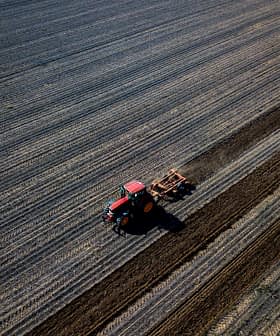Bring It On: Olive Oil Importers Welcome More Testing by FDA
Members of the House Committee on Appropriations have called on the Food and Drug Administration to update its report on the authenticity of extra virgin olive oil sold in the U.S.
In its fight to defend the integrity of mass-market olive oils, a trade group of American importers says it’s ready to go another round.
A recent report by the House Committee on Appropriations for the upcoming federal budget bill called on the U.S. Food and Drug Administration to update its 2015 study on the authenticity of extra virgin olive oil sold in the U.S.
The news was received with open arms by the North American Olive Oil Association (NAOOA), according to interim executive director Tom Mueller (not the Tom Mueller who wrote the exposés on olive oil frauds).
“We welcome it,” Mueller told Olive Oil Times. “We think this type of rigorous testing is important to ensure the total confidence of American consumers and to move away from some of the subjective, false rhetoric we’ve seen around olive oil that isn’t based on independent, scientific testing.”
The previous FDA study, conducted in 2015, tested 88 products labeled extra virgin olive oil. It used the gas chromatography method adopted by the International Olive Council to determine the composition and content of sterols and triterpene dialcohol. Three samples (3.4 percent) didn’t meet purity criteria, laid out by the U.S. Department of Agriculture, based on desmethylsterol and triterpene dialcohol compositions.
That 3.4 percent would equate to more than 10,000 tons of olive oil consumed in the U.S. each year — or the annual consumption for around 10 million Americans — that were “possibly adulterated with commodity oil and/or solvent-extracted olive oil.” Furthermore, the study tested olive oils labeled extra virgin for adulteration.
In fact, two of the three samples FDA researchers spiked themselves with 10 percent hazelnut oil went undetected for adulteration.
Still, the NAOOA found reason to cheer.
“The FDA’s findings are remarkably consistent with testing we’ve done in independent IOC labs over 25 years, which has found that 98 percent of olive oil sold in U.S. retail outlets is authentic and high-quality,” Mueller said.
That might be a stretch. While the FDA study found that most oils tested were unadulterated, it did not measure for high quality or that the samples met the chemical and sensory standards for the grades indicated on their labels.
“Congratulations — most olive oil isn’t cut with battery acid,” said a producer who sells the oil from his small family farm online and through farmer’s markets. “Testing for adulteration is one thing — and testing for quality is another. Most people still don’t get extra virgin when they pay for extra virgin and the FDA testing doesn’t address that.”
While the representatives of marketers, packagers and importers that make up the NAOOA show bravado — olive oil’s virtue has been regularly taking shots to the chin for quite some time.
Examples include the arrests of dozens in Italy accused of exporting fake olive oil to the U.S., an investigation into widespread mislabeling of extra virgin olive oil in Brazil, a global operation that seized $250 million in counterfeit and substandard food, and a Taiwanese food magnate who received a two-year sentence as part of an olive oil tainting scandal — just to name a few that have occurred in the past year alone.
Most enduring, of course, was the study by the University of California Davis with researchers in Australia in 2010 that found 69 percent of imported and 10 percent of California olive oil samples labeled extra virgin did not meet IOC and USDA sensory standards, and it showed that the chemical tests failed to confirm the sensory test results in a majority of cases.
For its part, the FDA says it is concerned about ensuring what’s on the label is deemed authentic in simple terms, along with protecting the public’s health.
“Economic adulteration of olive oil reduces consumer confidence in the commodity and can potentially circumvent proper hazard control and assessment,” FDA spokesperson Marianna Naum told Olive Oil Times. “There have been numerous reports of possibly adulterated olive oil. Our objective as outlined in the (2015) study was to see whether it was possible to detect if an extra virgin olive oil had been adulterated with another type of oil.”
A report last year by the House Committee on Appropriations called on the FDA to develop a testing system for all imported olive oils, which suggests lobbying efforts to implement a national standard for quality are succeeding.
“Olive oil standards currently exist in only four states, and there is no mandatory federal standard,” Mueller said. “A standard of identity would give the FDA, states and the industry a clear path to consistency and authenticity, encourage fair dealing within the entire marketplace and create greater protections for consumer interests.”








